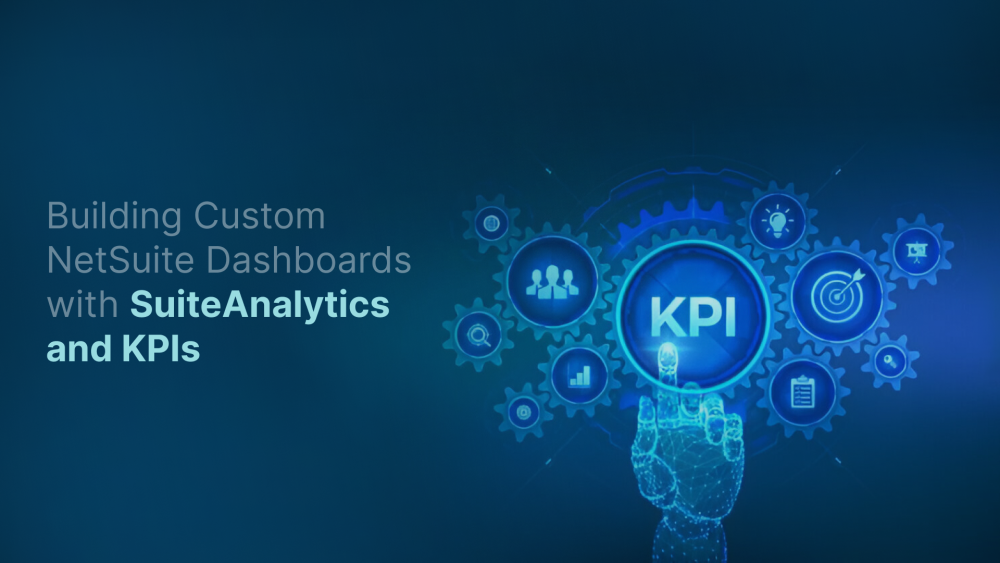In today's data-driven business landscape, real-time insights are crucial for informed decision-making. NetSuite, a leading cloud-based Enterprise Resource Planning (ERP) platform, empowers users with SuiteAnalytics and KPIs (Key Performance Indicators) to transform raw data into actionable intelligence. This blog delves into crafting custom NetSuite dashboards, equipping you with the knowledge to visualize key metrics and gain a comprehensive understanding of your business performance.
SuiteAnalytics and KPIs
SuiteAnalytics: An integral component of NetSuite, SuiteAnalytics provides a robust set of reporting and analysis tools. It allows users to:
-
Create custom reports: Generate reports tailored to specific business needs, analyzing various data points across different modules within NetSuite.
-
Leverage pre-built reports: Utilize pre-built reports for common business scenarios, saving time and effort.
-
Drill down into data: Explore data in detail to identify underlying trends and patterns.
KPIs: Represent quantifiable metrics that measure progress towards your business goals. They offer a quick and visual way to assess performance in critical areas. Here's how KPIs benefit businesses:
-
Improved Visibility: KPIs provide a clear view of performance, allowing for proactive decision-making and course correction when needed.
-
Enhanced Accountability: Tracking KPIs fosters accountability across departments and individuals, driving performance improvement.
-
Streamlined Communication: KPIs facilitate clear communication of business objectives and progress updates to stakeholders.
Example: A retail business might define a KPI for "Average Order Value" to track the average amount spent per customer order. This KPI can be displayed on a custom dashboard alongside other relevant metrics, such as "Sales by Product Category" and "Customer Acquisition Cost," providing a holistic view of sales performance.
Building Custom Dashboards: A Step-by-Step Guide
NetSuite offers a user-friendly interface for creating custom dashboards that display the information most relevant to your business needs. Here's a step-by-step guide:
-
Define Your Goals: Identify the key questions your dashboard needs to answer. Are you focusing on sales performance, inventory management, or customer satisfaction?
-
Select Relevant Data Sources: Choose the data sources (reports, saved searches) that provide the metrics you want to display on your dashboard.
-
Choose Dashboard Portlets: NetSuite offers various portlet types, such as "Report Snapshots," "Trend Graphs," and "KPI Meter." Select the portlets that best visualize your chosen metrics.
-
Customize Portlets: Configure each portlet to display specific data points, define timeframes, and set thresholds for KPI meters.
-
Arrange and Label: Arrange the portlets on your dashboard for optimal information flow and label them clearly for easy understanding.
-
Share with Users: Grant access to relevant users to ensure everyone has a clear view of key business metrics.
Statistics: Studies show that businesses that leverage data visualization tools like dashboards experience a 23% increase in profitability.
.png)
Powering Up Your Dashboards with the Latest Tools
SuiteAnalytics and KPIs are powerful tools, but recent advancements offer even greater capabilities:
-
Workbooks: Combine multiple reports, charts, and pivot tables into interactive workbooks for deeper data analysis and collaboration.
-
Saved Searches: Create dynamic searches that update automatically, ensuring your dashboards always reflect the latest data.
-
Custom KPIs: Define custom KPIs based on specific calculations or formulas, catering to unique business needs.
-
Third-Party Integrations: Integrate NetSuite with third-party data visualization tools for even more sophisticated dashboards and advanced analytics capabilities.
These advanced tools empower businesses to create dynamic and insightful dashboards that provide a clear picture of operational health and drive strategic decision-making.
Industry-Specific Dashboards: Tailoring Insights for Success
While core concepts remain consistent, custom dashboards can be tailored to provide industry-specific insights:
-
E-Commerce: Track key metrics like website traffic, conversion rates, and abandoned cart rates to optimize online sales performance.
-
Manufacturing: Monitor production costs, inventory levels, and machine downtime to identify areas for efficiency improvement.
-
Professional Services: Visualize project timelines, resource utilization, and billing performance to ensure project success and client satisfaction.
By integrating relevant data sources and utilizing industry-specific KPIs, businesses can create custom dashboards that offer actionable insights and propel them towards achieving their goals.
Integration Considerations and Potential Limitations
Integration:
-
Seamless Data Flow: Ensure all data sources feeding your dashboard are properly integrated to guarantee data accuracy and consistency.
-
Real-Time Updates: Leverage real-time data sources for dashboards that reflect the latest business performance.
Limitations:
-
Data Security: Ensure proper security measures are in place to safeguard sensitive data displayed on dashboards.
-
User Adoption: Train users on dashboard functionalities to encourage active utilization and ensure the dashboards provide value.
-
Complexity Management: Avoid overloading dashboards with too much information, prioritize clarity and focus on key metrics.
By carefully considering integration aspects and acknowledging potential limitations, you can build secure, user-friendly, and informative dashboards that empower data-driven decision-making across your organization.
Conclusion: Transforming Data into Actionable Insights
NetSuite's SuiteAnalytics and KPIs, coupled with custom dashboards, offer a powerful toolkit for transforming raw data into actionable business intelligence. By following the steps outlined above, leveraging the latest tools, and tailoring dashboards to your industry needs, you can gain valuable insights into your operations. Remember, effective dashboards promote data-driven decision making, improve operational efficiency, and ultimately drive business success.


